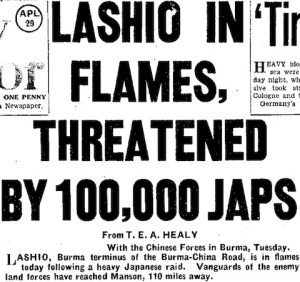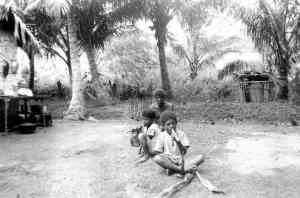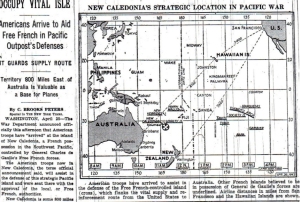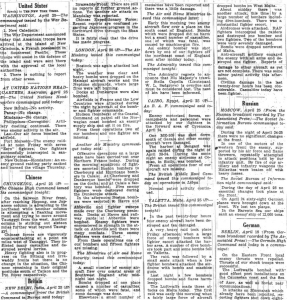April 1942 (3)
23 April – troops of the Chinese Expeditionary Force held off the Japanese advances around Twingon, Burma, which allowed thousands of Allied troops into the area of Tenangyaung to escape the enemy’s surrounding net. But, six days later, when the Chinese 55th Division were defeated in the northern zone, the Japanese forces reunited and together the divisions successfully cut the Burma Road. On the 30th, General Stilwell, who was appalled by the Chinese leader’s corruption, dubbed Chiang Kai-shek “Peanut” for his do-nothing attitude, received permission to withdraw his troops to India.
25 April – US troops landed on the Free French colony of New Caledonia. The island’s capital, Nouméa became a major US naval base. [The “Boomer” generation might recall this island as the naval base where “McHale’s Navy” was stationed. For the younger readers, this was a very popular sit-com about a bunch of misfit sailors during the war, staring Ernest Borgnine and Tim Conway.)
30 April – during the heavy bombing and artillery fire transpiring on Corregidor, P.I., incredibly, 2 Navy PBY flying boats managed to land and take off again. They were able to evacuate 50 people from ‘The Rock’, mostly from the female nursing staff.
To sum up April 1942: Doolittle’s Raid caused the Japanese Navy to overreact and deploy nearly every warship in the Imperial Combined Fleet. They dispersed into far too many different operations over too great a distance. One of the major objectives was their vital plan to sever the American sea route to Australia and allow the capture of Port Moresby, New Guinea. The US Naval fleet and Admiral Nimitz, despite being aware that they lacked the strength of the Japanese, felt they could use their military intelligence against the enemy.
Japanese Admiral Inouye developed a series of complex operations for both sides of the Coral Sea. [the US sea route]. This plan was virtually dependent on the element of surprise, but this major factor was foiled by the Australian Coastal Watching Service, when the radio outposts reported spotting the enemy in the upper Solomons.
Another mistake was made on the part of the Combined Fleet’s eagerness to disperse. Their wide distribution and speed resulted in the failure to change their signalling codes. Hence, intelligence outposts from Alaska to Australia were able to pick-up and de-code Japan’s messages, (code-named JN 25). This uncovered every move the enemy made during the Second Operational Phase.
Click on images to enlarge.
################################################################################
Military Humor – the Old and the New
################################################################################
William Ackerman – Granite Ridge, CAN; RC Navy
Edward Brooke III – Washington DC; US Army, WWII
Stanley Butlin – Birmington, UK; RAF, radio telecommunications 
Erland Coombs – Scarborough, ME; USMC, WWII, PTO, Purple Heart
Noel Ford – Christchurch, NZ; LAC No. 5 SU Air Force # 439576, WWII
Henry Guardino – El Centro, CA; USMC, Korea, radio operator
David Joy – Connerville, IN; USMC, Vietnam / US Army (15 years)
Helen McKinley – Jupiter, FL; civilian, Secretary to the Red Cross Field Director, WWII
Kenneth Staples – Stroudesburg, PA; UA Army Air Corps, WWII, F/187th/11th A/B
Fernand Tremblay Sr. – Meriden, CT; US Army, WWII, Sgt., Silver Star
Woody Whigam – Folkston, GA; US Army, WWII
################################################################################
Posted on January 12, 2015, in WWII and tagged family history, History, Humor, Japan, Military, New Guinea, nostalgia, USA, veterans, war, WWII. Bookmark the permalink. 75 Comments.

















Enjoyed your tribute to your father. My Dad was in the 26th infantry, landed at Utah Beach, and fought in the Ardennes and the Battle of the Bulge, etc. I’m glad to see people like you offering tribute to our nation’s heroes. I’ll be adding a post on my father soon. Thanks.
LikeLiked by 1 person
I’m very glad you enjoyed the post and hope we will see more of you. We have a terrific bunch of people contributing or just reading. I’m looking forward to seeing your father’s info.
LikeLiked by 1 person
I just put up excerpt 3 of a German War Bride letter to her soldier husband. It was also in 1942 of January though. So interestting to read this which was close to the same time.
LikeLike
I’ll be over there to read it shortly. Yes, the letters and stories help tell the whole concept of war.
LikeLike
Fascinating as always and I’d love to learn more about coastal watchers – are there any books you can recommend? Along with code breakers they played such a critical role. Seems like the contribution of code breakers is far more recognized though.
LikeLike
Frankly, not any one particular book. There were watchers from Australia, New Zealand, the US, and the natives from these islands. So, pretty much every WWII book has info on them and there are different books on the specific groups. I have one post from the beginning portion of this blog, but that is quite weak in its data, so I’ve been accumulating info for a couple more posts on them.
LikeLike
Thanks for the nostalgia on McHales Navy. If memory serves me it was on right after either Combat or the Gallant Men. I had to bust my butt to get my homework done in order to watch these shows.
LikeLiked by 1 person
My dad and I were glued to the TV set!!
LikeLike
Yep, same here.
LikeLiked by 1 person
Thanks gpcox for the reminder of how dire was the situation for the Allies in April-May 1942.General Stillwell was remarkable for providing a worthy response to the Japanese advances in Burma . General Wingate for his resistance and counterattacks in Burma and China. The Allies in the pacific at the Coral Sea , showed that the Japanese were not invincible.
Ron
LikeLike
How right you are, Ron – they showed a crack in their armor that the Allies continued to widen. Very glad to see your interest.
LikeLike
I remember watching McHale’s Navy!
Thank you for your educational blog on WWII. This was my father’s history. He would not talk much about it himself.
LikeLike
Anything you might remember him saying or data you discover on him, feel free to put it here in the comments. Thanks for stopping in.
LikeLike
There is one story I recall. I don’t know where he was at the time, but he and a bunch of other men were hunkered down with a lone sniper firing at them. The was a soldier with him who was known as “Chicken Neck”, or something to that effect. Chicken Neck would pop up now and then and taunt the sniper, who eventually blew himself up out of frustration for continuing to miss. Whether he made this story up for us kids or whether it was real is unknown
LikeLike
I would venture to say that the sniper either saved his last bullet for himself or someone, somewhere finally got him. No dad is going to tell his daughter the truth about suicide – not like that anyway. Good story. If any more pop into your head, you know where to find us. Thanks Lavinia.
LikeLike
Sobering, as always, but great cartoons.
LikeLike
Thanks, Hillary.
LikeLike
Hi, I nominated you for the One Lovely Blog Award. You can see it on my blog at https://thewallgalleryblog.wordpress.com with the instructions. This award is any easy one to follow. I have really enjoyed your blog and hope you accept the challenge. Thanks and keep up the great work!! Kirt Tisdale
LikeLike
I deeply apologize, Kurt, but I do not accept awards being as nothing in this blog is about me. I sincerely hope you understand and will not allow this to interfere in our friendship. Please note that I am very honored that you feel I deserve an award and I thank you very much.
LikeLiked by 1 person
I totally understand, so don’t give it a second thought! Keep up the great work on your blog!
LikeLike
Thank you for everything, Kirt. Your understanding and loyalty mean a great deal.
LikeLiked by 1 person
Interesting to read the input coast watchers had in various aspects of the war, I recall reading somewhere that many were killed by the Japanese, I also believe that many of our Aboriginals were seconded to coast watch duty, mainly because of their ability to access and live in extreme coastal locations, dont quote me on that one gp, cant recall its source.
Regards
Ian
LikeLike
I do know the natives of many of the islands were “enlisted” into service and helped conceal the watchers, acted as bearers, etc. Many were killed by the enemy too. I did a post on the Coastwatchers a while back and will be doing another fairly soon – a brave bunch!
LikeLiked by 1 person
Always great information here. My wife’s father was in Iwo Jima in WWII. It is ashame that he did not chronicle more of the information. He evidently manned the radar and was in the Airforce…and I believe back then they had not yet created the official Airforce but were categorized Army. Incredible times…thanks for saving the history!
LikeLike
Wish I knew what unit your father-in-law was in, I might be able to help with some info. Most of the men felt that no one would be interested – I know my father Smitty felt that way. And you are correct – they were the Army Air Corps. Thank you for your interest.
LikeLike
When you think of the atrocities that were committed, it was a miracle the nurses were able to escape. They would have likely faced a very vile end.
You report on the coast watchers – they were indispensable. To have been able to elude the Japanese and survive on those stinkin’ islands took not only courage but a miracle.
LikeLike
Not only courage, but endurance. They went months in boredom. I did a post on them a while back, but I’m planning an updated one – they provided an invaluable service and never received the proper recognition for their work.
LikeLiked by 1 person
People of that generation never received the proper recognition… Put it this way… Do you think that punk Justin Bieber can even give up three years of his youth…and survive? 🙂
LikeLike
You’ve got to be kidding! Too pampered – wouldn’t survive boot camp!
Thanks for the joke this early in the morning, Koji!
LikeLiked by 1 person
Well, it wasn’t a joke… Can you imagine?? 🙂 Lol!
LikeLike
I wish we had an emoticon for tongue-in-cheek when I asked if you were kidding – NO, I can’t imagine! 😆
LikeLiked by 1 person
Those coastal watchers were amazing.
LikeLike
Siting on an island, bored for months on end so that you can be in the right place at the right time when a ship sails by and then run for your life as the enemy lands – not exactly a fun job description, eh? I had a post just for them in the past, but since then I’ve come up with more info, so there will be another one. Thank You for visiting, Ann.
LikeLiked by 1 person
That’s good to know that there will be another post on them.
LikeLike
You can count on it.
LikeLiked by 1 person
Of course, I remember McHale’s Navy. The code-breakers are very interesting to me as I have a friend who did that immediately after WWII. He has attempted to explain their difficult code-breaking techniques. Seems to me they had to be an intelligent group of young men.
LikeLike
Yes, they were a smart bunch, Bev. I’m sure you must know Mustang Koji by now; his father was a translator.
LikeLike
So he was one of the geniuses that had a lingual/mathematical mind? If so, he was not on a potential battlefield but in a HQ office? Civilian?
LikeLike
I don’t believe the SIS had civilians, except maybe back home as secretaries. SIS had the “nerds” in the States and the field operators working on all aspects of the code. You know that better than I.
LikeLike
Indeed a mathematical genius, who was on the USS Chilton, but I guess it was later than I thought. He served in the Navy from 1951-1954 but told me of the complicated wheel they used for sending secret messages even then. Didn’t mean to get out of your time frame, but reminded me of the stories he tells.
LikeLiked by 1 person
No problem, all the vets need to be remembered. I was not familiar with the Chilton, despite her service in WWII in the Pacific as a Bayfield attack transport, so I looked into her. That time span covers the Korean War and part of the Cold War, so I’m quite certain they had plenty of secret messages. Never hesitate in talking about a veteran here, Bev!!
LikeLike
These folks are never out of “the time frame”! They were secret weapons on either side of the conflict. 🙂
LikeLiked by 1 person
Very true there, Koji.
LikeLiked by 1 person
Funny that you mention ” McHale’s Navy ” . My dad was aboard ship out there and he loved that dumb show . Reminded him of how the navy did business , I guess .
LikeLike
I understand quite a bit of the show’s episodes was suggested by ex-Navy just as M*A*S*H* had Army vets writing in with incidents that occurred to their units in Korea. Any stories from your Dad, Dan? You know I’m always asking for them.
LikeLike
Though I remember watching the show I had no idea the island was real. I thought it was part of a set.
LikeLike
Yes, the actors were on a studio set, but the island does exist and was a major naval base where the support troops you rarely hear about handle the supplies, equipment and materiel needed distributed at the other islands. They had the hospitals [not as one we would call a hospital], but nurses, doctors and medical for the wounded and rest for the battle-weary. All part a part of a great link in an enormous chain….
LikeLiked by 1 person
FASCINATED….I mean spellbound! Phil
LikeLike
Thank you so much for that, Phil. It’s great to hear and I can often use the encouragement.
LikeLike
What a interesting article. I remember “McHale’s Navy” well so that makes me a old-timer..lol 🙂 Found the signalling very interesting and how they were able to de-code the messages. Thanks Everett!
LikeLike
You’re always welcome, Kathy.
LikeLiked by 1 person
Amazing history, as usual. Also the picture of our warrior kneeling in front of the flag. I respect the humility and am awed they can even walk with that much on their backs.
LikeLike
That’s backpacking old-style, wouldn’t you say! They take a lot, you’ve got to give them credit [like we always try to do]!!!
LikeLike
My grandpa mailed letters and pictures home from New Caledonia during the war (he was a Marine). Looked fairly pleasant, but I know he was also trying to reassure my great grandparents.
LikeLike
It was a naval base for us, the island never saw combat, so he was fairly safe there. Being a Marine, I doubt he was always there, just some R & R. Have I missed reading those letters?
LikeLike
No, you haven’t–I’m still working on the story of his parents. More to come, albeit slowly!
LikeLike
Phew! I’ll look forward to reading it.
LikeLiked by 1 person
Another very informative post. Thanks a lot. But just how clever did you have to be to decode Japanese?
LikeLiked by 1 person
Very clever back then, John. Anglos and Americans knew close to nothing about the people, language, etc. Even the decoding machine took a long time – it didn’t just pop out the translation and decoding like we have today with computers; but that is an excellent question – I’ll bet not many people even thought about it.
LikeLiked by 1 person
In summary, the Japanese diplomatic code was broken in 1939 by the US Army’s top secret cryptanalysis group called “Signal Intelligence Service”, or SIS. It focused their energies on the Japanese diplomatic code. The group was headed up by William F. Friedman.
As for JN-25 – knowing they were heading to war against the US – the Japanese Navy prudently changed their code. The US Navy had their own cryptonanalysts: OP-20-G. While the Japanese navy changed their code along the way (which had been completely broken), OP-20-G had little difficulty breaking those, too… until late in 1940. Knowing they were headed to war with the US, the Japanese navy prudently introduced an entirely new code, the JN-25. It was much, much more complex than its predecessor. It proved difficult to crack but they had made progress when… the Japanese navy once again made amendments to JN-25 immediately before the attack on Pearl Harbor.
The US Navy, therefore, was pretty much “blind” intel-wise for pretty much a week before Pearl Harbor. It would not be completely broken until March 13, 1942 but enough could be read to be valuable.
Both groups were kept under a top secret umbrella code called MAGIC.
LikeLiked by 1 person
Excellent synopsis of the Intel codes used by the Japanese, Koji, thank you. I would not have been able to spell it out so clearly. BTW -if you have the time, please come back to read Gypsy Bev’s comment – her friend/your father – do you think they knew each other?
LikeLiked by 1 person
I don’t think so. Dad was not in code breaking… Just translating for the war crimes trials and captured enemy documents. I forgot to mention each of the two code breaking groups had several key Caucasian men; all had been either born in Japan or had lived there likely through religious or embassiorial ties.
LikeLike
Good to know, thanks, Koji. I know your Dad was a translator. I don’t think the other reader knew the extent of work that went into decoding and translating and thought it would be rather simple.
LikeLike
It’s interesting to read about the way small decisions combined to affect the war one way or the other. Thanks again for finding the little details.
LikeLike
And there is so much more, Dan. What went on, in Australia for example, is better described in the “Great Betrayal” by David Day. [Churchill double-talking Australia – we can better understand it as FDR abandoning Corregidor.] But I try to give the gist of the events. Thanks for reading.
LikeLike
Love the Peanut anecdote.
LikeLiked by 1 person
Isn’t that a hoot! I thought it would be in reference to his height, but they knew he was just stealing the Lend Lease money for himself and his cohorts. What a waste!
LikeLiked by 1 person
I am sure FDR knew all about Peanut.
LikeLike
If he didn’t, I know Madam Chiang told him! Yet money continued to pour over there.
LikeLiked by 1 person
Thank goodness for code-breakers in both theatres of action.
LikeLike
It would have been an even longer war….they saved many lives.
LikeLiked by 1 person
Another informative post, GP. It sets up the background for the mobilization of US troops sent to the CIB theatre–including my father. There’s a picture, in one of my posts, with Gen. Stilwell, Chiang Kai-shek & Mme. Chiang Kai-shek–the three of them are laughing.
LikeLike
Stilwell was probably laughing AT Chiang aka “Peanut”, eh? Thanks for coming by this morning, Adam.
LikeLiked by 2 people
He was probably telling some tired, lame joke instead of attending to the business of running the country. It’s no wonder Mao was successful in 1949.
LikeLike
Outside of taking our money, I really don’t know what he did.
LikeLike